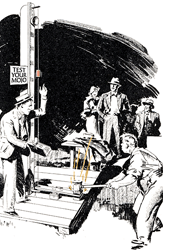 |
 |
04.12.10

What’s Killing Your Mojo? Mojo is that positive spirit toward what we are doing now that starts from the inside and radiates to the outside, writes Marshall Goldsmith. It’s that sense others get about us that comes from the harmony between what we feel about what we are doing and what we show on the outside. It’s about two simple goals: loving what you do and showing it. Mojo is that positive spirit toward what we are doing now that starts from the inside and radiates to the outside, writes Marshall Goldsmith. It’s that sense others get about us that comes from the harmony between what we feel about what we are doing and what we show on the outside. It’s about two simple goals: loving what you do and showing it.
The kind of positive impression you make profoundly affects your ability to influence. Mojo can make or break your leadership effectiveness. The greater your Mojo, the more times you’ll ring the bell. Goldsmith says that four ingredients need to be combined in order for you to have great Mojo: Identity: Who you think you are? Or how do you perceive yourself? Our identity is created in a number of ways: remembered (life experience), reflected (what others think of us), programmed (what others think we should be) and created (what we consciously choose to be). “To change your Mojo, you may need to either create a new identity for yourself or rediscover an identity that you have lost.” Achievement: What have you done lately? There is a difference between what we think we achieve and what others think we achieve. When these get out of sync we can have a Mojo crisis. Understand what "achievement" means to you. “Try not to go through life deluding yourself by pretending that when the world cares, you do—or pretending that when the world does not care, you do not care.” Reputation: What do other people think you are? Your reputation is a scoreboard kept by others. You can’t control it, but if it’s killing your Mojo, there's a lot you can do to improve it. You can choose the reputation you want if you are disciplined enough to live out your objectives in daily, consistent behaviors. Acceptance: What can you change, and what is beyond your control? Acceptance means you dispense with what Goldsmith calls the Great Western Disease—the “I’ll be happy when…” statement. You know how it goes: “I will be happy when I have a million dollars in the bank, when my house is bigger, or when I look the way I want.” There’s nothing wrong with wanting those things but we often fixate on the future at the expense of enjoying the life we’re living now. Worse still we whine, complain and lay blame for things that happen to us instead of taking it all in stride. “By carrying around anger and negative baggage, we weigh ourselves down. We limit our opportunities to find meaning and happiness. We kill our Mojo.” We kill our Mojo by committing mistakes like these: Over-committing. When you're bursting with Mojo, everybody wants you be a part of what your doing. This can lead to over-commitment. It is “one of the sweet but risky blowbacks from having Mojo." Understandably we don’t want to look weak, naturally we loved to be included, or perhaps we think we’re superhuman, but whatever the case it can kill our Mojo. Waiting For the Facts to Change. This is wishful thinking. It is a common response to a setback. It’s the opposite of over-committing because while you’re waiting for a more comfortable set of facts to appear, you do nothing. Goldsmith helpfully advises: “When the facts are not to your liking, ask yourself, ‘What path would I take if I knew that the situation would not get better?’ Then get ready to do that.” Looking For Logic in All the Wrong Places. Humans are not always logical, yet we persist in trying to find logic where no logic exists or try to prove others wrong with our superior logic. Again Goldsmith nails it: “The next time you pride yourself on your superior ‘logic’ and damage relationships with people you need at work—or the people you love at home—ask yourself, ‘How logical was that?’” Bashing the Boss. This should speak for itself. See acceptance. Refusing to Change Because of “Sunk Costs.” “We persist in error,” says Goldsmith, “because we cannot admit error.” If your decisions are based on what you have to lose instead of what you have to gain, your “sunk costs” may be costing you more than you know. Confusing the Mode You’re In. There is our professional mode and our relaxed mode. And we shift between the two without even thinking about it. “The executives you most admire tend to be those who, with constant discipline, never drift out of professional mode….They have chosen a role for themselves, and they rarely go off script. They are professionals. That’s why they have Mojo.” In the final chapters of the book, you will find 14 tools to help you build, rebuild or redefine your Mojo. Goldsmith pours his understanding of people and situations, gained from years of experience, into this book. Acting on his wisdom will save you the unnecessary detours so common to the human condition. Of Related Interest:
Posted by Michael McKinney at 07:59 AM
|
BUILD YOUR KNOWLEDGE
 

How to Do Your Start-Up Right STRAIGHT TALK FOR START-UPS 
Grow Your Leadership Skills NEW AND UPCOMING LEADERSHIP BOOKS 
Leadership Minute BITE-SIZE CONCEPTS YOU CAN CHEW ON 
Classic Leadership Books BOOKS TO READ BEFORE YOU LEAD |